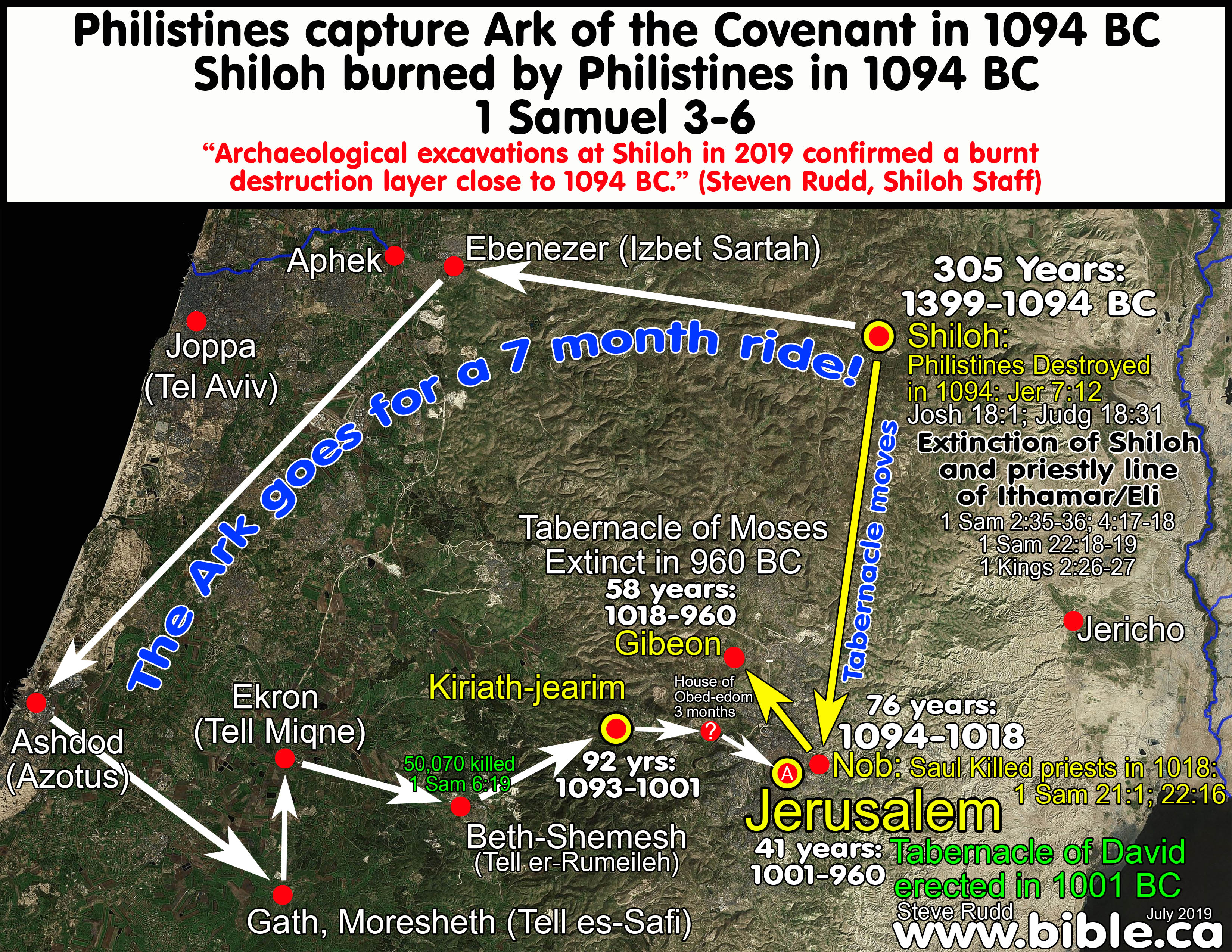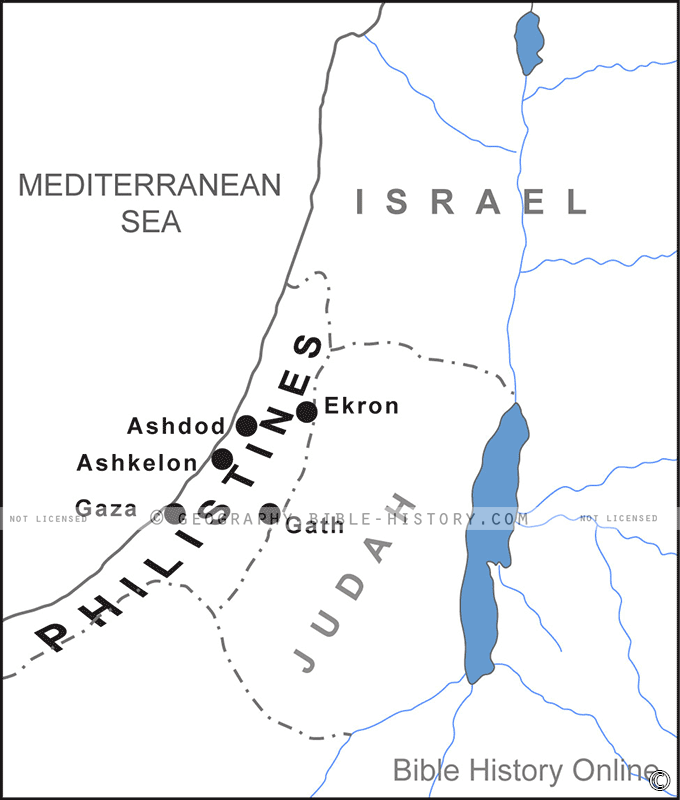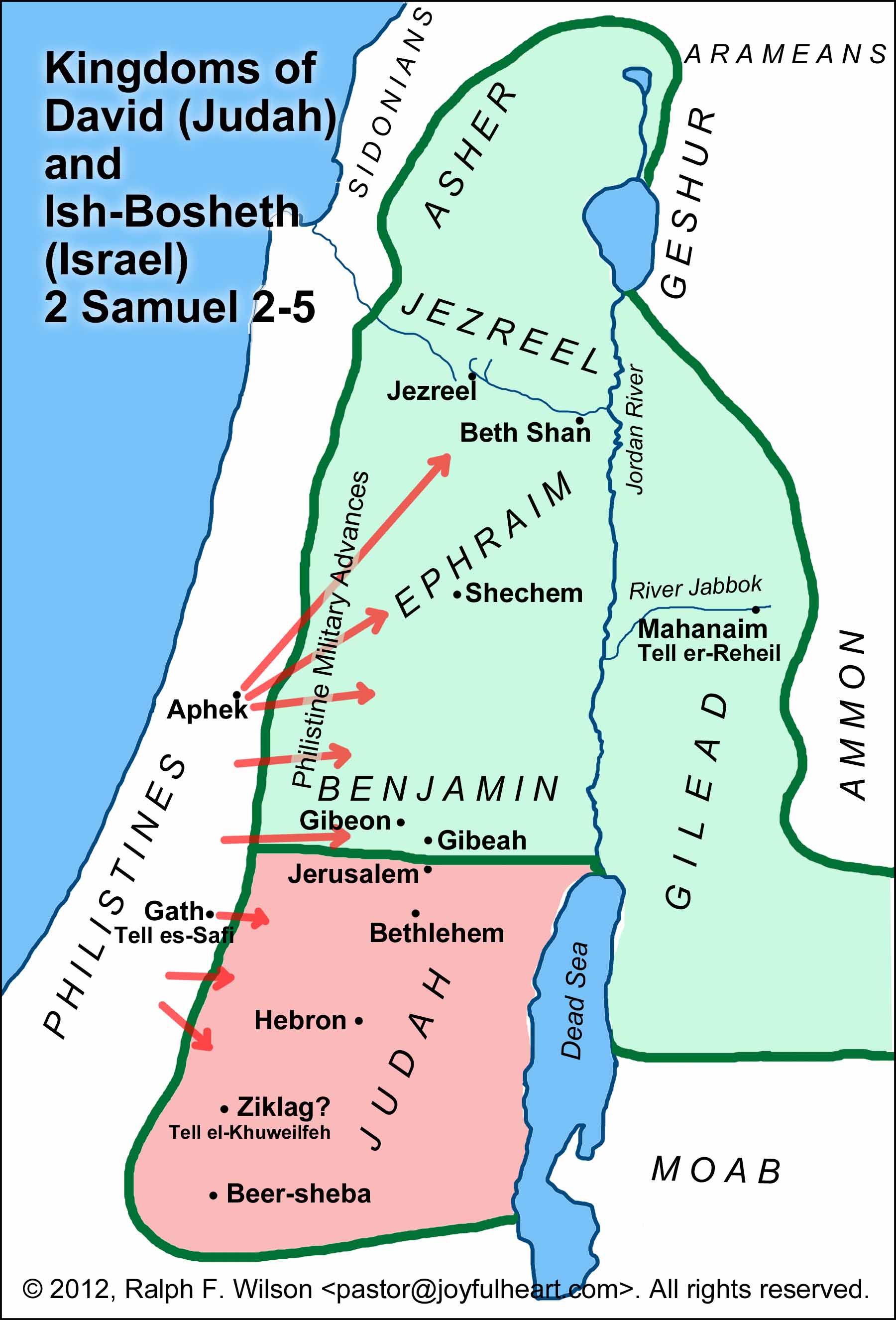
Map of Philistia and Judah marking the location of Khirbet alRaʿi. Download Scientific Diagram
In c.1024BC, the Philistines launched a major attack on the Israelites from their most northerly outpost at Aphek. The ensuing Battle of Ebernezer was a disaster for the Israelites, with the Philistines capturing the Ark of the Covenant and taking it as booty to their stronghold at Ashdod (see 1 Samuel 4:1-11).

Judges — Samson and the Philistines iBible Maps
1 Samuel 17:23 As he talked with them, behold, there came up the champion, the Philistine of Gath, Goliath by name, out of the ranks of the Philistines, and spoke according to the same words: and David heard them. 1 Samuel 17:52 The men of Israel and of Judah arose, and shouted, and pursued the Philistines, until you come to Gai, and to the.

Philistia Alchetron, The Free Social Encyclopedia
Map of the Territory of the Philistines You are here: Home Bible Maps Map of the Territory of the Philistines Explore the Bible Like Never Before! Unearth the rich tapestry of biblical history with our extensive collection of over 1000 meticulously curated Bible Maps and Images.

Philistines Advance into the Central Hill Country Bible Mapper Blog
This map shows the coastal area controlled by the Philistines and some of the battles they engaged in with Israel. The map is taken from http://www.bible-history.com/geography/maps/map_philistine_cities_expansion.html

Israel and Judah Map Bible Odyssey
This map shows the areas of expansion by the Philistines around the 10th century B.C. This was the time period when Saul had died and David began to reign in Israel. The Philistines were clearly superior in strength but the Lord promised that he would be with Israel.

Philistine Definition, People, Homeland, & Facts Britannica
The Philistines frequently encroached on Israelite territory, which led to some battles, including the famous clash between David, the Israelite, and Goliath, the Philistine (1 Samuel 17). They were condemned for being idol worshipers (1 Samuel 5:1-5) and soothsayers (Isaiah 2:6).

Maps Of Israel In Saul 1 Samuel
The Philistines were an ancient people of uncertain origins. They settled in the southern coastal region of ancient Canaan around the 12th century BCE. They formed a confederation of five coastal cities: Gath, Ashkelon, Ekron, Gaza, and Ashdod. The modern-day equivalent of their former territory covers most of the Gaza Strip and coastal Israel.

Map of Philistine Cities and Expansion (Bible History Online)
ge'-rar (gerar, "circle," "region"; Gerara): A town in the Philistine plain South of Gaza ( Genesis 10:19 ), where both Abraham and Isaac ' sojourned for a time, and where they came into contact with Abimelech, king of Gerar (Genesis 20 and 26, passim).

Master Index of Free Bible Maps of Bible Times and Lands
PHILISTIA fi-lis'-ti-a: The country is referred to under various designations in the Old Testament: namely, pelesheth (Philistia) ( Psalm 60:8 (Hebrew 10 ); 87:4), 'erets pelishtim, "land of the Philistines" ( Genesis 21:32, 34 ), geloth hapelishtim; Septuagint ge ton Phulistieim, "the regions of the Philistines" ( Joshua 13:2 ).

105. 716 BC and the Philistines are still around? Book of isaiah, Bible mapping, Isaiah
Location 1. The Valley of Elah is about 15 miles (23 km.) west of Bethlehem and about 20 miles (32 km.) east of the Mediterranean Sea. 2. It's located on the western edge of the Judean lower hills and was an important travel route from the coastal cities up to the center of the land of Judah and its main cities of Bethlehem, Jerusalem, and Hebron.

Bible Maps The United Kingdoms of David and Solomon 1000 BC Bible mapping, Mystery of
The Philistines occupied the fertile coastal area in the southwestern part of the land of Canaan. They were a nation of warriors, trained in the art of war from their youth (1Samuel 17:33) like the city-state of Sparta. Their location, coupled with their war-like attitude and desire to expand their influence in the region, made them ancient.

The Land of the Philistines Basic Map (72 DPI) 1Year License Bible Maps and Images
A Formidable Adversary. Below are some of the major reasons the Philistines were ancient Israel's determined and protracted enemy. 1) They trained their children, at an early age, in the art of war (1Samuel 17:33). 2) The Philistine cities of Gaza, Gath and Ashdod housed giant enemy warriors known as the children of Anak (Anakim, Numbers 13:28.

7. David King and Conquers Jerusalem (2 Samuel 25). Life of David Discipleship Lessons
This map features the five Philistine city-states mentioned in the Bible. The Philistines were not one of the original seven nations of Canaan (Deuteronomy 7:1).. They originated from Caphtor , which has traditionally been identified as Damietta on the eastern end of the Nile Delta, and settled in five city-states near the Mediterranean coast: Azzah (1), Ashkelon (2), Ashdod (3), Ekron (4) and.

Definition and Map of the Levant Region Map, Bible, Bible mapping
The Philistines ( Hebrew: פְּלִשְׁתִּים, romanized : Pəlīštīm; LXX: Koinē Greek: Φυλιστιείμ, romanized: Phulistieím; Latin: Philistaei) were an ancient people who lived on the south coast of Canaan during the Iron Age in a confederation of city-states generally referred to as Philistia .

The Five Philistine Cities The Israel Bible
This map shows the areas of the ancient Philistines around the 10th century B.C. This was the time period when Saul had died and David began to reign in Israel. The Philistines were clearly superior in strength but the Lord promised that he would be with Israel. The Philistines expanded eastward toward Jerusalem but were stopped by King David and the armies of Israel.

The Ark of the Covenant Is Captured and Returned Bible Mapper Atlas
The historic Philistines (Hebrew: פלשתים, plishtim) were a people who inhabited the southern coast of Canaan around the time of the arrival of the Israelites, their territory being named Philistia in later contexts. Their origin has been debated among scholars, but modern archaeology has suggested early cultural links with the Mycenaean world in mainland Greece.